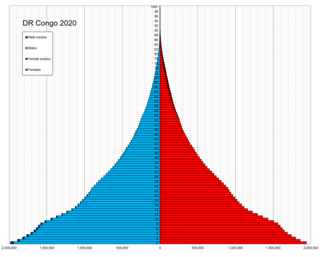
Demographic features of the population of the Democratic Republic of the Congo include ethnicity, education level, health, economic status, religious affiliations and other aspects of the population.

The Democratic Republic of the Congo is a country in Central Africa. By land area, the DRC is the second-largest country in Africa and the 11th-largest in the world. With a population of around 112 million, the Democratic Republic of the Congo is the most populous Francophone country in the world. The national capital and largest city is Kinshasa, which is also the economic center. The country is bordered by the Republic of the Congo, Central African Republic, South Sudan, Uganda, Rwanda, Burundi, Tanzania, Zambia, Angola, the Cabinda exclave of Angola, and the South Atlantic Ocean.

Bukavu is a city in eastern Democratic Republic of the Congo (DRC), lying at the extreme south-western edge of Lake Kivu, west of Cyangugu in Rwanda, and separated from it by the outlet of the Ruzizi River. It is the capital of the South Kivu Province and as of 2012 it had an estimated population of 806,940.
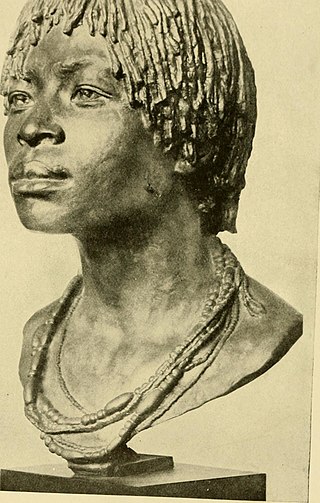
The Kongo people are a Bantu ethnic group primarily defined as the speakers of Kikongo. Subgroups include the Beembe, Bwende, Vili, Sundi, Yombe, Dondo, Lari, and others.
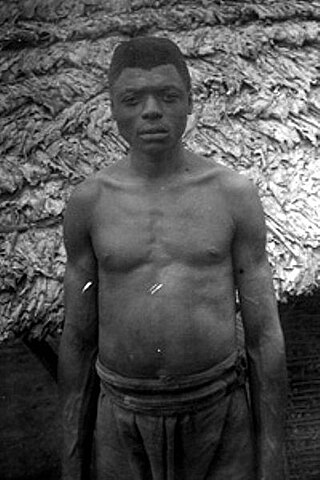
Kimbanguism is a Christian new religious movement professed by the African initiated church Jesus Christ's Church on earth by his special Envoy Simon Kimbangu founded by Simon Kimbangu in the Belgian Congo in 1921. A large, independent African-initiated church, it has an estimated 6 million believers and has its headquarters in Nkamba, Kongo Central. The denomination became a member of the World Council of Churches, the All Africa Conference of Churches, and the Organization of African Instituted Churches. In June 2021, the World Council of Churches withdrew membership on doctrinal grounds.

The culture of the Democratic Republic of the Congo is extremely varied, reflecting the great diversity and different customs which exist in the country. Congolese culture combines the influence of tradition to the region, but also combines influences from abroad which arrived during the era of colonization and continue to have a strong influence, without destroying the individuality of many tribal customs.

Catholicism has a major presence in the Democratic Republic of the Congo (DRC). It is part of the worldwide Catholic Church under the spiritual leadership of the Pope in Rome.

Simon Kimbangu was a Congolese religious leader who founded the Christian new religious movement Kimbanguism. Kimbanguists consider him to be an incarnation of the Holy Spirit.
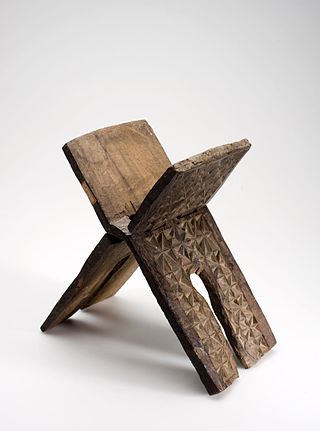
Islam is a minority religion within the Democratic Republic of the Congo, where the large majority of the population is affiliated with various Christian denominations and sects. It was first introduced to the Congo basin from the East African coast during the 19th century and remains largely concentrated in parts of Eastern Congo, notably in Maniema Province. Most Congolese Muslims are Sunni and follow the Shafi‘i and Maliki school of jurisprudence (fiqh). Though estimates vary, it is generally believed that between one and 10 percent of the country's population identify as Muslim.

Christianity in Africa first arrived in Egypt in approximately 50 AD. By the end of the 2nd century it had reached the region around Carthage. In the 4th century, the Aksumite empire in modern-day Ethiopia and Eritrea became one of the first regions in the world to adopt Christianity as its official religion. The Nubian kingdoms of Nobatia, Makuria and Alodia followed two centuries later. From the late fifth and early sixth century, the region included several Christian Berber kingdoms. Important Africans who influenced the early development of Christianity and shaped the doctrines of Christianity include Tertullian, Perpetua, Felicity, Clement of Alexandria, Origen of Alexandria, Cyprian, Athanasius and Augustine of Hippo.

Bundu dia Kongo, known as BDK, is a new religious movement with a political and cultural agenda that is associated with the Kongo ethnic group. It was founded in June 1969 but officially in 1986 by Ne Muanda Nsemi, who was the group's current leader until his death and is mainly based in the Kongo Central (Bas-Congo) province in the Democratic Republic of the Congo.
Christianity in Angola has existed since 1491. Today 80% of Angolans practise some form of Christianity.

Religion in Angola is diverse, with Christianity being the most widely professed faith. Roman Catholics constitute 41% of the population. Other Christian denominations include Baptists, Methodists, Congregationalists, Lutherans, Reformed Churches and Seventh-day Adventists and Jehovah's Witnesses - all these denominations making up about 43% of the population.

Christianity is the predominant religion in the Democratic Republic of the Congo, with Catholicism and Protestantism being its main denominations.
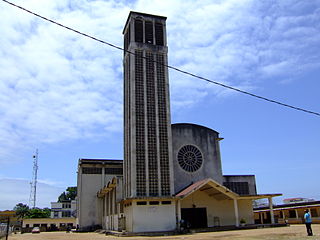
Christianity is the predominant religion in the Republic of the Congo, with Catholicism being its largest denomination.

Christianity is the most widely professed religion in Tanzania, but in the island of Zanzibar most of the population is Muslim.
Simon-Pierre Mpadi was a follower of Simon Kimbangu who later established his own Messianic Christian-inspired religious group in Congo.
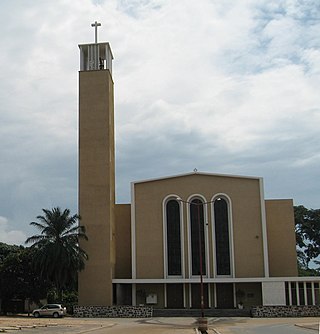
Christianity is the majority religion of Burundi. It is estimated to be the religion of between 75–94 percent of the Burundian population. Of these, the majority are Catholics and Protestants make up the remainder. The religion first entered the country under European colonial rule (1890–1962) and remains popular. There are estimated to be 557 separate Churches registered in the country.
Christian population growth is the population growth of the global Christian community. According to a 2011 Pew Research Center survey, there were more than 2.2 billion Christians around the world in 2010, more than three times as many as the 600 million recorded in 1910. However, this rate of growth is slower than the overall population growth over the same time period. In 2020, Pew estimated the number of Christians worldwide to be around 2.38 billion. According to various scholars and sources, high birth rates and conversions in the Global South were cited as the reasons for the Christian population growth. In 2023, it was reported: "There will be over 2.6 billion Christians worldwide by the middle of 2023 and around 3.3 billion by 2050, according to a report published in early January by the Center for the Study of Global Christianity at Gordon Conwell Theological Seminary."
Charles Daniel Kisolokele Lukelo was a Congolese politician and a key member of the Kimbanguist Church. He was appointed a minister of state in the first Congolese government and later served as Minister of Parastatals and Minister of Work and Social Welfare.
















